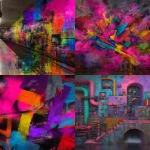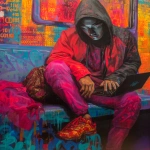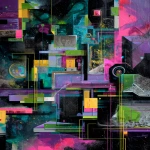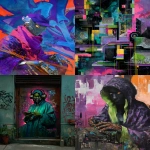Explore the Best AI Image Gallery

Bridging Reality and Imagination: VR/ARs Transformative Impact on Gaming and Creativity
The realm of gaming has always been a playground for imagination, but recent advancements in virtual reality (VR) and augmented reality (AR) are blurring the lines between fantasy and reality. These immersive technologies are not just redefining how we play games; theyre also reshaping the creative landscape, empowering artists, designers, and developers to explore new frontiers of expression and innovation.
The Immersive Playground: VR/AR in Gaming
VR and AR are revolutionizing gaming by transporting players into entirely new worlds. In VR, users don headsets that block out the physical environment, creating a fully immersive experience where they can interact with digital objects and characters as if they were real. This sense of presence fosters deeper engagement and allows for unparalleled levels of realism and interactivity.
- Action and Adventure: VR has transformed action games into adrenaline-pumping experiences, allowing players to physically move and interact with their surroundings.
- Storytelling and Exploration: AR overlays digital elements onto the real world, enriching existing environments or creating entirely new ones. This opens up possibilities for narrative-driven games that blend seamlessly with the players physical location.
Beyond Entertainment: VR/ARs Creative Canvas
The applications of VR and AR extend far beyond gaming. These technologies are becoming powerful tools for creative expression, offering artists, designers, and developers a new dimension to explore:
- Visual Arts: Artists can use VR to create immersive installations and sculptures that viewers can walk through and interact with.
- Design and Architecture: Architects can utilize AR to visualize their designs in real-world settings, allowing clients to experience the space before its built.
- Filmmaking and Storytelling: VR allows filmmakers to create immersive cinematic experiences that transport audiences into the heart of the story.
Ethical Considerations: Navigating New Territories
As with any emerging technology, VR/AR raises ethical considerations that need careful attention:
- Privacy and Data Security: The collection and use of user data in VR/AR environments raise concerns about privacy. Its crucial to ensure transparent data practices and protect user information.
- Accessibility and Inclusivity: Making VR/AR experiences accessible to individuals with disabilities is essential for fostering inclusivity.
- Misinformation and Manipulation: The immersive nature of VR/AR can make it easier to spread misinformation or manipulate users. Its important to develop safeguards against these potential risks.
Looking Ahead: The Future of VR/AR
The future of VR/AR is brimming with possibilities. As technology advances, we can expect even more realistic and immersive experiences. Here are some key trends to watch:
- Enhanced Hardware: Continued improvements in display resolution, processing power, and tracking systems will create more realistic and comfortable VR/AR experiences.
- 5G and Beyond: Faster network speeds will enable seamless real-time interactions and streaming in VR/AR environments.
- AI Integration: Artificial intelligence will play an increasingly important role in enhancing VR/AR experiences, from generating realistic virtual characters to personalizing content.
VR/AR are poised to revolutionize not only gaming but also countless other aspects of our lives. By embracing these technologies responsibly and fostering innovation, we can unlock their full potential to transform creativity, entertainment, education, and beyond.






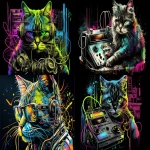


](https://images.ai-img.art/thumbnails/150/33d5e6d1da2b8ec2c4b8eab20d051c27c26d7a4991a77faf06fd03e96617fb1e.webp)





](https://images.ai-img.art/thumbnails/150/1aa8215ea9a4f6970e81a10bdb4feb3b08d5e1a202c3c7ed2c9380f2f63d5a74.webp)
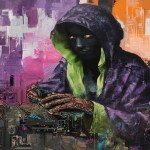




](https://images.ai-img.art/thumbnails/150/664a559b73eaff070d6f7fc7b3b151718aef9fa3a3f12f90b3c9092ceaa3cb56.webp)
